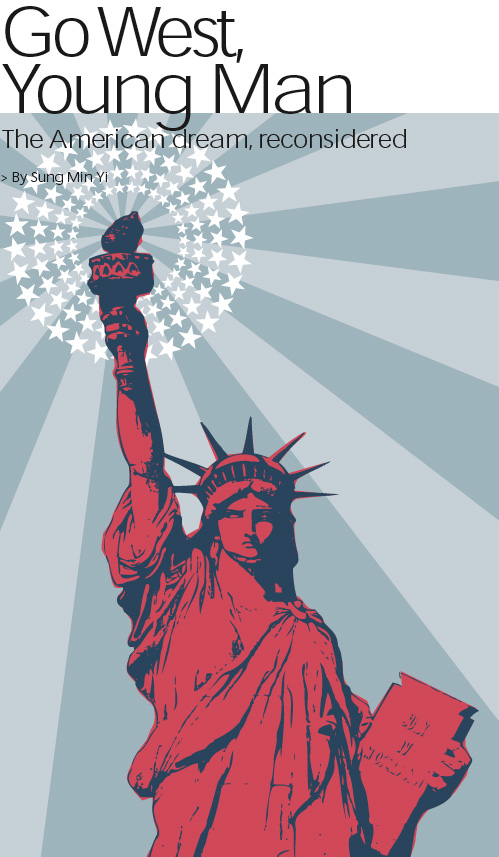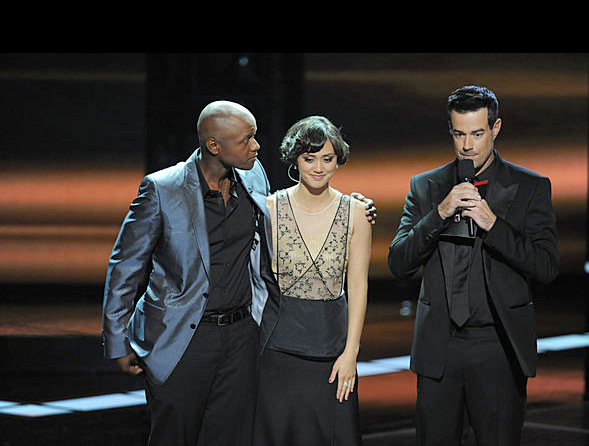Over the years, KoreAm has documented the impact of the 1992 Los Angeles riots on ours and other communities, and urged an understanding of lessons learned. As we count down to the 20th anniversary next year, charactermedia.com will be running a riot article, image or testimonial in this space every week until April 29, 2012. Some will be taken from our pages, while others will be excavated from our own personal archives. We welcome your submissions—first-person memories (no word limit), pictures, poems and (photographed/scanned) artifacts—for this project, too. Please email them to julie@charactermedia.com with the subject line ‘Riots Spot’. Many of us were mere children in 1992, but 19 years later, we have voices. We can speak now.
Here’s an article from KoreAm‘s May 2009 issue.
THE AMERICAN DREAM, RECONSIDERED
by Sung Min Yi
FIFTY thousand Koreans are singing “Go West,” and they’re keeping me awake. I presume it’s the Pet Shop Boys’ version, though it’s hard to tell.
To explain: World Cup 2002. Korea Republic vs. Poland. My parents had warned me that they would wake me up at 4:30 a.m. PST to watch The Game, and I’d blithely agreed to it. And now, here I am, swaddled like an invalid on the couch while my parents are clapping, chanting, burning with religious fervor, their faces aglow, the living room lights still mercifully off. So, here we are and there they are. Fifty thousand plus two Koreans trying to will our team to victory through the power of song.
“Go West,” despite its Gay Liberation associations, has proven remarkably robust in its afterlife as a soccer chant. But for me, the song evokes my uncle, who’s been dead for about 10 years. I thought my mother would have the same reaction, but at this moment, she registers nothing but absolute absorption in the fate of the Reds. My waesamchon. We never saw much of my extended family growing up. So my memories of my uncle are that he owned a series of liquor stores in Los Angeles during the ‘80s and ‘90s, had a pool and cable TV and looked like an Asian John Ritter of Three’s Company fame.
We went to his place twice a year, for New Year’s and the anniversary of my grandfather’s death. Our goal was always to perform the ancestral worship ritual as soon as we got there. Everyone rushed to cook the food, stack the fruit, set up the table, the portraits and the incense, and then, the ceremony, with its bowing. Lots of bowing. Afterwards, my uncle left to open the store. Waiting for him to return was always worthwhile because he gave the most saebaedon. But he insisted on working a full day, so part of the ritual always included the interminable wait.
I remember the fever of boredom as we waited, checking the clock, learning to despise the Rose Parade for its wastefulness. Sometimes I wondered how his day was going. The first time we went to visit him at his store, I remember scouring the aisles with my brother, trying to find the single most delicious item we could, while my mom talked to him. We’d inevitably leave with a blade of watermelon Jolly Ranchers, and then it’d be years between visits, always a different store by then, in a different part of town. I’m not sure if the stores themselves got progressively more rundown. I don’t remember if they were in worse parts of town, either. But I remember a rack of second-tier porn titles like Orientail, and people buying loosies, and my uncle, smiling Ritter-esque over it all, unfazed.
Soon Ja Du. Latasha Harlins. Menace II Society. When all the “Blacks vs. Koreans” stuff started happening, the only concrete action I took was a personal boycott of Ice Cube’s Death Certificate album. I never really imagined how it might be affecting my uncle, that customers might be approaching him with newfound swagger, demanding credit or threatening him, giving him looks like he should get it, like all the f—ing Koreans, exactly what you people deserve. We didn’t hear from him until April 30, the second day of what would become known as the L.A. riots. When he finally called, I remember sitting on the stairs, listening while my mother talked on the phone in the kitchen. He’d stayed on his roof all night, shooting into the parking lot when anybody got too close.
I imagined the reddened sky silhouetting his tense body, perched on the roof above a pockmarked parking lot, a blatantly cinematic image that filled me with pride. Everything was fine, my mother said he said. Everything was fine. A year later, two thieves rushed into the store, took $200 he had in the register and ran for the door. One of the thieves stopped, turned and shot him in the chest. We didn’t even have time to visit the hospital. My mother got the call in the evening, just after I’d gotten home from school, and she just sat there, gray, shrinking. I hugged her and she cried into my T-shirt. I tried to stay as still as I could.
The police said there was little hope of catching the thieves. Local newspapers covered the crime, and it was the first time I’d ever seen my relatives’ names in print, in English. I thought they’d misspelled my aunt’s name until I realized that it was my other aunt’s name, and that I’d never actually known it. Their names still looked like typos. Our extended family sat together in a row at the wake. My brother commented on how all of our hands looked alike, and he folded them in the same way everybody else had. Glancing at the body, I could see that it was bloated, swollen, looking nothing like the portrait by the coffin of my uncle in his late 20s, when he’d just gotten to America. It seemed like an odd choice to use such an old picture.
Once we had all filed by the body, his widow collapsed, clawing at the coffin and screaming wildly. I couldn’t make out most of it out, but it seemed like she wailed, over and over, that he could have been a salaryman. I kept thinking of my mother’s favorite perspective-restorative: that after the Korean War, she and her siblings had sat around a steaming bowl of millet, which was cheaper than rice, skimming thin spoonfuls and passing it around, chewing slowly because that was all the food they would have that day.
Over a decade later, after a split country, poverty and a series of autocratic regimes, those siblings decided to fly. Anything had to be better than all that instability, they must have thought. No matter how bad it was anywhere else, how could it compare? Suck it up because it can’t be as bad as it used to be.
So the Suckitup Generation came to the U.S. and became widgets in the American Dream machine. My uncle, my aunts and my mother settled in the same city, transplanted roots from which to chase the best damn thing in the world: stability. And for their children, that same best thing in the world. Just suckitup! The children wouldn’t even know it. But everybody was so busy suckingitup to make stability possible that siblings who had passed around the spoon of millet now only saw each other once, twice, three times a year. The children saw little of their parents and even less of their parents’ siblings. But suckitup! It’ll all work out in the end. The American Dream.
After the funeral, we did our de rigeur goodbye bows and trudged to our cars. I remember sitting in the dark car in the cemetery, me, my parents and my brother. My dad turned the ignition on, and the radio started playing “Go West.”
“This song has a sad melody,” my mom said. We haven’t seen much of the relatives since. The ancestral worship rituals have ended, too. The portraits and the incense were wrapped up in boxes somewhere, even as more family members have passed away. The sun is starting to come up. Korea Republic stunned Poland by winning, 2-0. The crowds went home, ready to sing their chants another day. We start folding blankets and making breakfast. The fact that my mother didn’t remember “Go West” makes me wonder whether the song has the same associations for her. Maybe I’d made it all up. I play the song for my mom as we drive to the market a few days later. “This is an old song, right?”
“Yeah.”
“The melody is sad.”
I ask if I should change the song.
“No, leave it.”
We drive in silence.










